Reviewing your employer’s response to COVID-19
Nulab Staff
May 14, 2020
The fallout of COVID-19 and the slow reopening of a paused economy have certainly given employers a lot to think about. Some have risen to the occasion, while others floundered, albeit in an unprecedented situation. What we wanted to know, however, was what employees thought of their employer’s response to COVID-19. How were execs and managers handling the situation, and were there any standout procedures that employees really appreciated in such an unusual business year?
Speaking directly to 1,002 Americans who were employed during the height of the coronavirus outbreak, we were able to find which steps most companies took, how employees perceived the action, and the likelihood of a COVID-19 misstep impacting employee tenure. If you’re curious to see how your employer stacks up or how you may want to be treating your employees, you’ll want to keep reading.
Changing perceptions
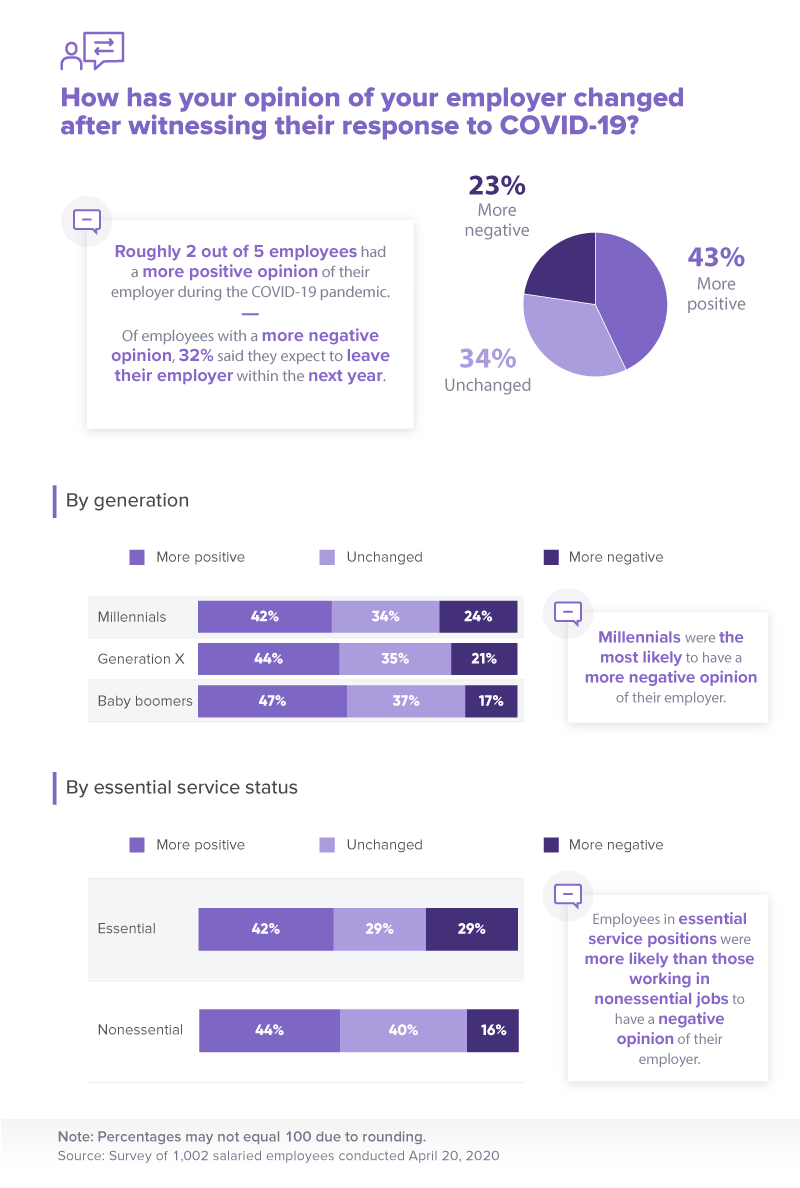
First, we turned our study to look into how a person’s opinions about their employer may have changed as a result of their response to COVID-19. Most employee opinions had actually become much more positive since the outbreak, suggesting that the American corporate body did rise to the occasion. That said, employers weren’t shining in everyone’s eyes, and nearly 1 in 4 employees had a more negative opinion of their employer after witnessing their company’s response to the pandemic. And of these people, 32% said they already plan on leaving their place of employment within the next year, suggesting an increasingly long recuperation period for the post-coronavirus economy.

Millennials were the most likely generation to feel opinions of their employers worsen throughout the pandemic. This may be a direct result of the fact that this generation was actually the hardest hit, on average, financially speaking. This generation lost more jobs than any other from the pandemic, while experts also explain that people who enter the labor market with high unemployment “typically see a 10% hit to income in the first year.” With a lowered wage or a job lost altogether, it may be harder for this generation to feel particularly positive about their employers’ decisions and response to COVID-19 and beyond.
Maintaining safety
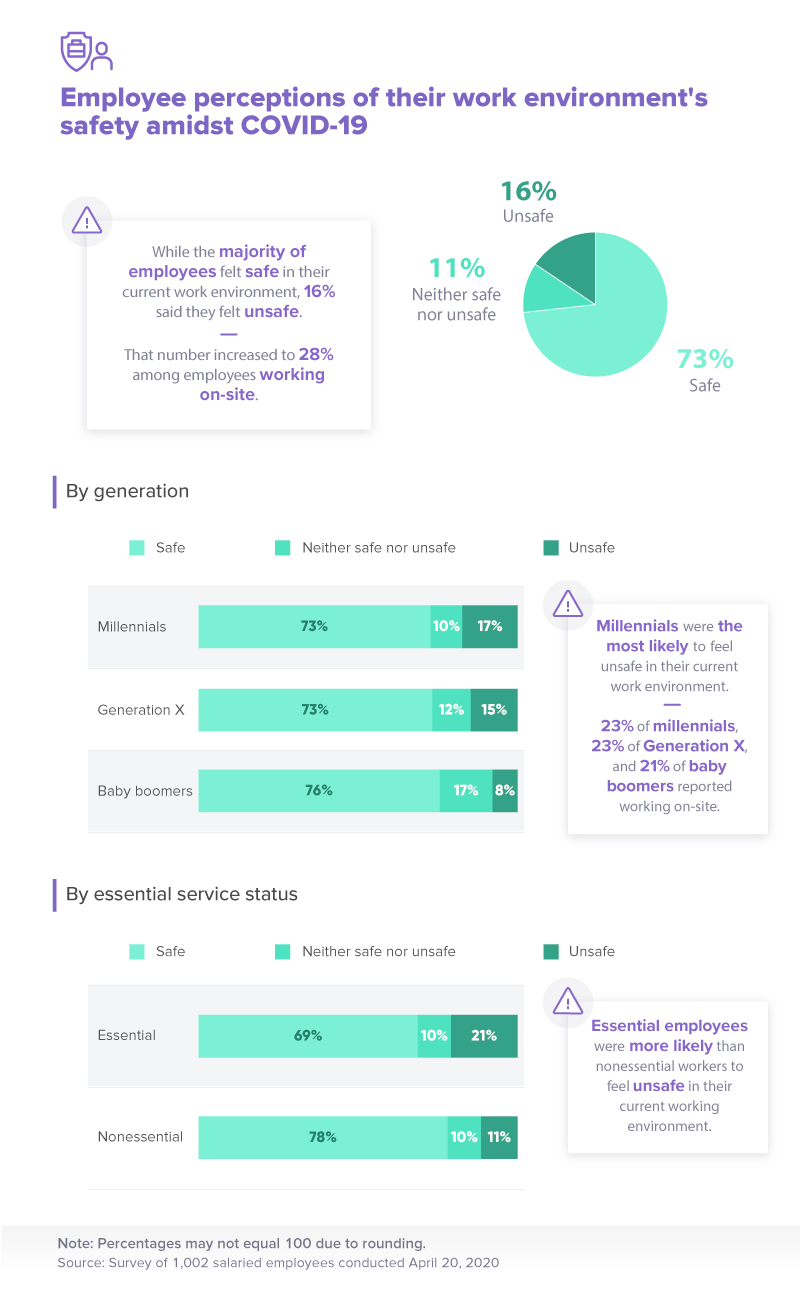
Our study also looked into employee safety, as health concerns have taken unusual precedence over all typical aspects of employment this year. The vast majority — 73% — still felt safe at work, even amidst a global crisis. We would be remiss, however, to not note the 16% of workers who currently feel less safe working than they used to. Some significantly less so. In their current work environment, 28% of on-site employees in particular reported feeling unsafe. This likely includes many of the essential workers who have not had the luxury of staying home and quarantining. Millennials and Gen Xers were the most likely to feel unsafe and were also the most likely generations to report continuous on-site work, even during quarantine.

Essential workers of all ages were even more likely to feel unsafe and be required to work on-site. Hospitals in particular, which have been flooded with both on-site workers as well as COVID-19 patients have even gone so far as to fire doctors and nurses who are speaking out about unsafe conditions. If they haven’t already, employers can also offer safety training and arm their employees with knowledge. Employers can also designate team members to an internal safety team, increasing communication, safety, and teamwork.
Leaving the employer behind
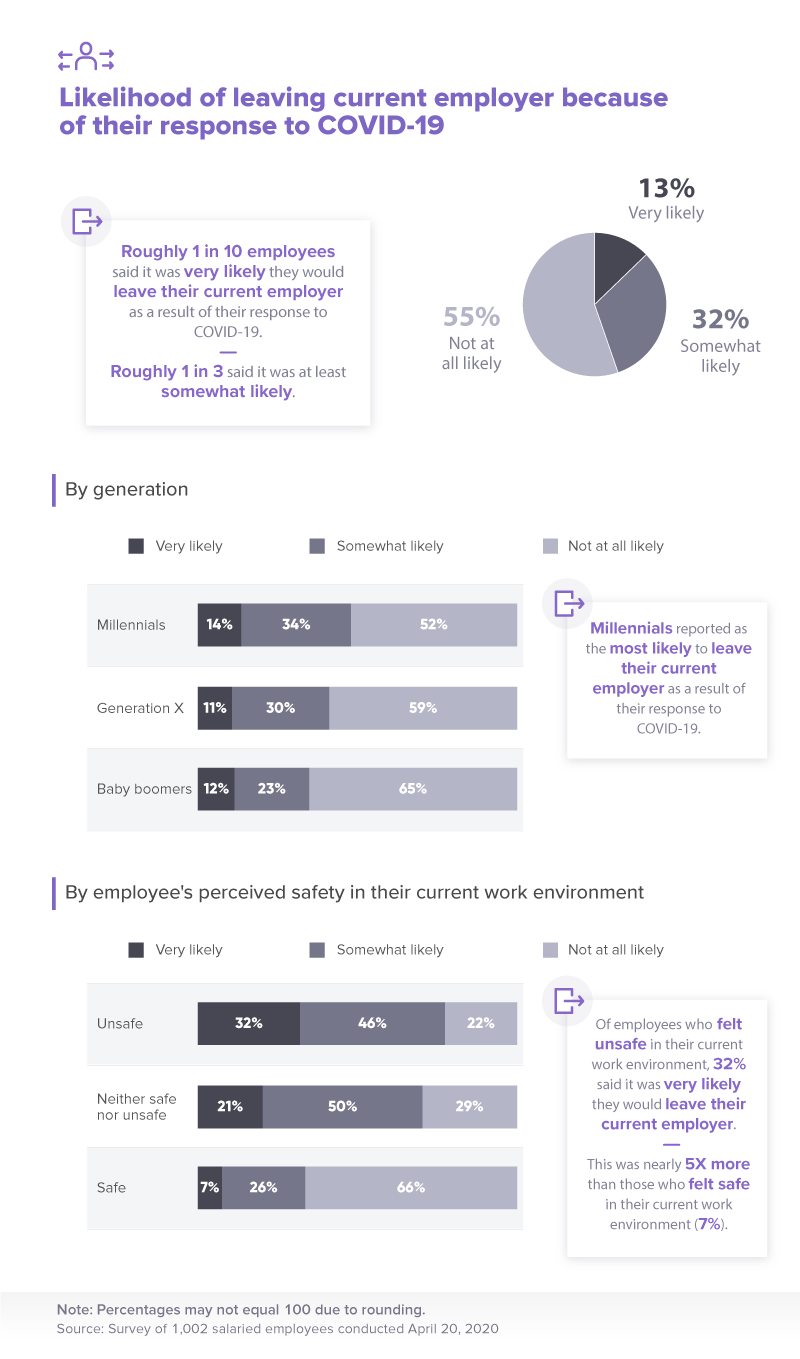
Even though American employees and employers have demonstrated untold resilience, the lack of safety, the sick co-workers, the strikes, and many other industry disruptions are likely not going to exist in a vacuum or completely disappear in a few months, even amongst the best of companies. Instead, many of the employees we spoke to that were experiencing things like poor leadership or a lack of safety felt increasingly ready to leave their employers altogether.
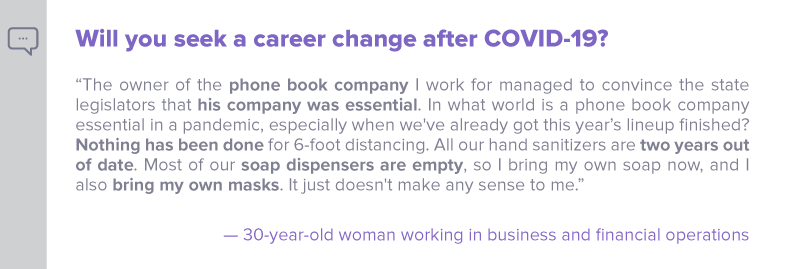
Of the employees who felt unsafe in their current work environment, 32% said it was very likely that they would leave their current employer. This was over three times as many as those who said they felt safe in their workplace. In other words, helping employees to feel safe likely dramatically increases tenure. In order to maintain tenure, it’s important to let employees know that you’re not taking this day by day. Generate a plan and show your employees an image of what you’re thinking as a leader. Will you implement better screening for office visitors? Will remote policies or sick policies change? These are all considerations that may cause even a disgruntled employee to reconsider.
When we considered all employees together – the ones who felt safe and those who did not – we unfortunately still found that 1 in every 3 employees felt at least somewhat likely they would quit specifically because of the way their employer handled the virus. Let this serve as a reminder of just how important leadership is in a time of crisis.
Grading employer response to COVID-19
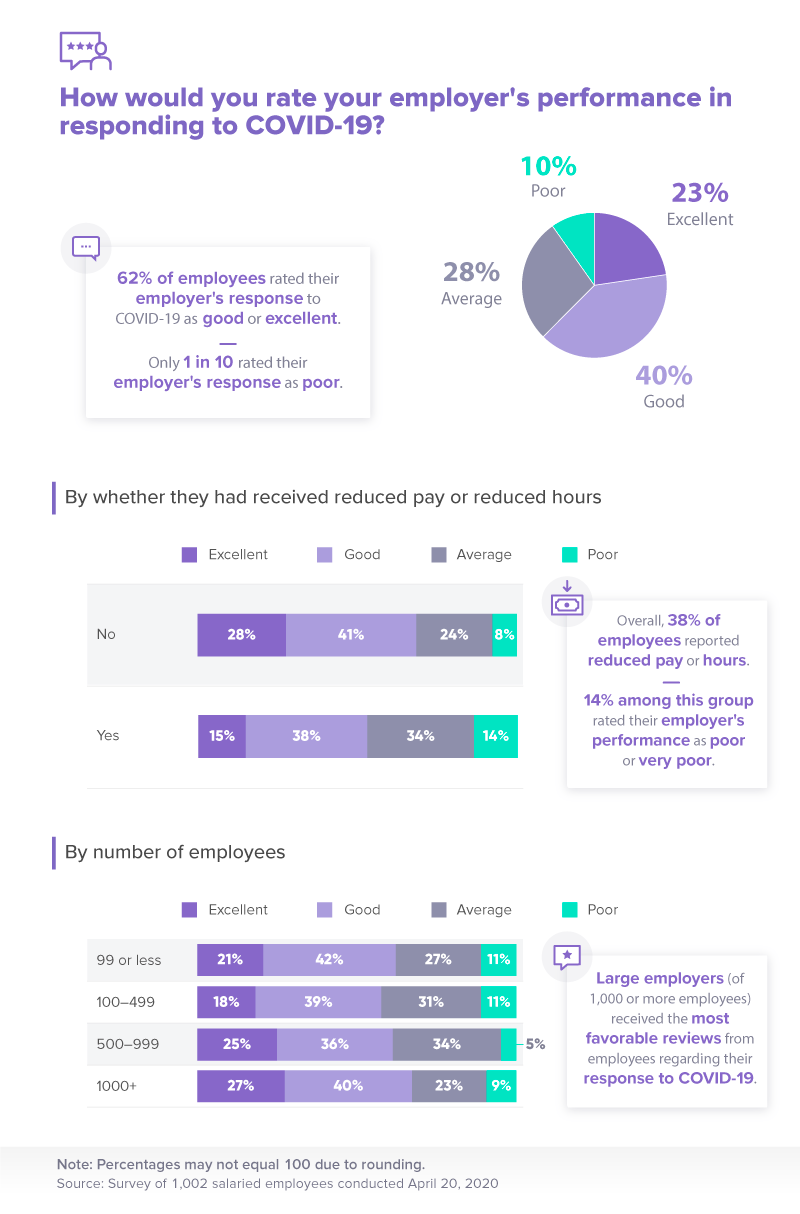
When looking to grade employers’ overall performance in response to COVID-19, most actually received a “good” or even “excellent” score in spite of the unprecedented times.
Even if a person’s pay or hours were cut due to the virus, employees remained understanding. Though 38% of respondents had to deal with a cut of this nature, only 1 in 10 rated their employer’s response to the virus as “poor.” That said, the likelihood of a negative perception did increase if their employer cut pay or hours.

A person’s perception of their employer was also likely to change if they worked at larger, more established businesses. Large employers of 1,000 or more employees received the most favorable reviews from their workers. That said, larger companies often have more resources and finances to pull from in times of crisis.
Taking action
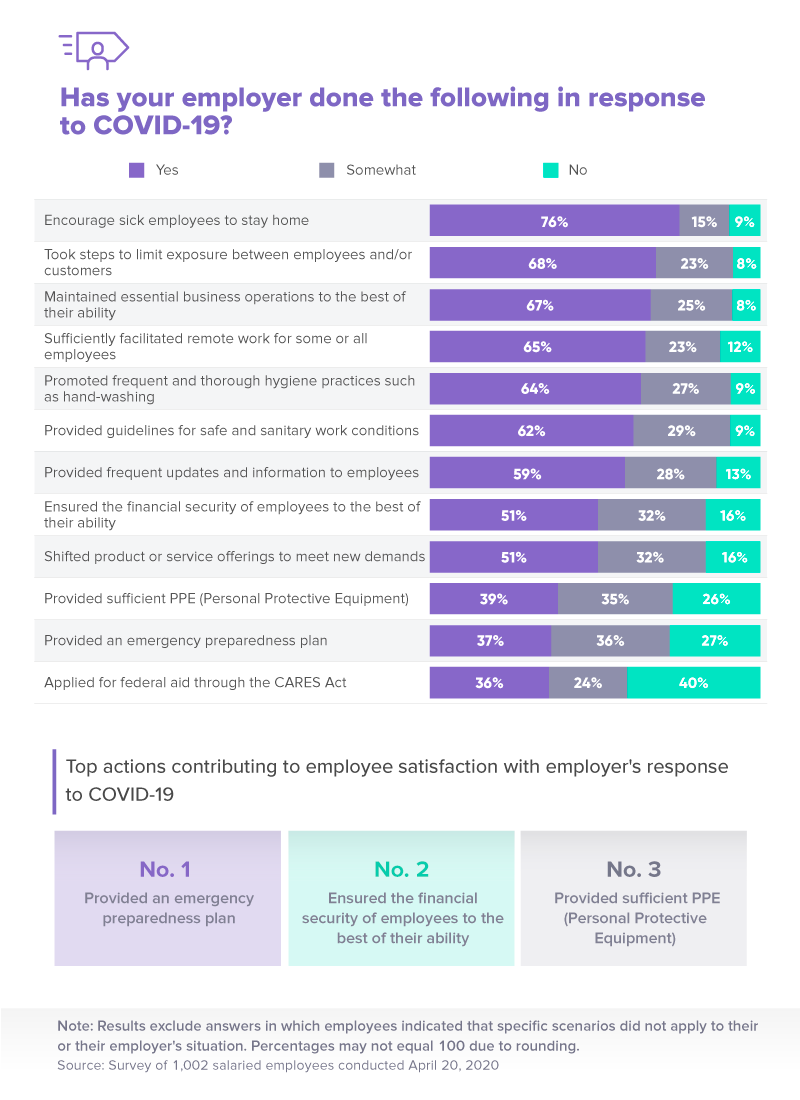
Next, we asked employees to tell us exactly which steps their employers had taken to handle the pandemic. The 10% of employers who are not handling the situation well will want to pay close attention to the following statistics. Employees definitely noticed and did not appreciate employers who didn’t encourage a worker to stay home even if they were sick. Nearly 10% of employers did this. Just 39% provided personal protective equipment, and even fewer had an emergency preparedness plan. Communications were also flawed – only 59% felt their employers sent communications frequently enough. And applying for federal aid through the CARES Act was one of the rarest employer responses, although it may not be necessary for each business’s unique situation.

Though it makes sense that employees would look to their corporate leaders in times of uncertainty to take some of these actions, the difficulty or near impossibility of actually doing so became evident early on in the pandemic. For instance, even first responders were often unable to get the protective equipment they needed to do their jobs. That said, a lack of communication and especially the lack of encouragement to stay home if symptomatic are arguably inexcusable, if not illegal.
Getting back to work
Ultimately, the coronavirus has taught us a lot about ourselves, and the data shows it. Employees learned what types of leaders their employers really were. Most employers rose to the occasion and received accolades from their employees, even in such a trying time. Others, however, neglected basic safety precautions and will likely see a longer period of fallout from their employees, who often told us they were ready to quit.
One of the best and simplest ways a company can prepare for bad days like this, as well as enjoy the good days, is with good communication. At Nulab, communication tools are our bread and butter. Our team is working remotely, utilizing our own collaborative tools, to ensure we can provide your business with seamless communication from the safety of home. We help companies like yours gain access to the products and prices your company needs to facilitate collaboration, planning, communication, and ultimately your bottom line. If you could use a more seamless approach to employees working together, start exploring Nulab today.
Methodology and Limitations
We conducted a survey of 1,002 Americans who were employed full-time. The survey was conducted on April 20, 2020. Respondents were then asked questions in relation to their perceptions of their employer’s response to the COVID-19 pandemic.
Fifty-five percent of our respondents identified as male, 45% identified as female, and less than 1% identified as a gender not listed on our survey. Thirty-one percent of respondents were employed at a company with less than 100 workers, 26% with 100 to 499 workers, 13% with 500 to 999 workers, and 31% with 1,000 or more workers. Respondents ranged in age from 19 to 78 with a mean of 38 and a standard deviation of 11.2.
It is possible that with more respondents from each demographic, we may have been able to gain better insight into these populations. The data we are presenting rely on self-report and, as such, are susceptible to exaggeration or selective memory.
No statistical testing was performed. The claims listed above are based on means alone and are presented for informational purposes.
Fair Use Statement
If you know anyone who may benefit from the findings of this study, you are welcome to share this article with them. Just be sure you link back here and that your purposes are noncommercial.

